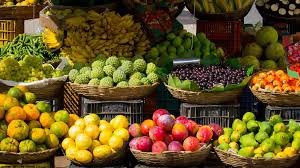Nutrition
Back to Our Roots: Growing what we eat, eating what we grow

Did you know you can grow tomatoes, peppers, kontomire, and even carrots in plastic bottles, buckets, or old cooking pots right on your balcony or backyard?
Across Ghana, families are rediscovering the joy and power of growing their food, even with limited space and resources. With rising food prices and growing concerns about chemically treated produce, more people are turning to home gardens as a low-cost, healthy, and empowering solution to address malnutrition and food insecurity.
Malnutrition remains one of Ghana’s most urgent challenges, with children facing stunted growth and anaemia, while adults battle increasing cases of obesity and diet-related illnesses. But solving this crisis isn’t just about eating more, it’s about eating right, eating safely, and eating smart. And that starts with going back to our roots.
By planting vegetables at home, families can cut food costs, eat fresher meals, and reduce dependence on produce grown with harmful chemicals. Schools, churches, and even workplaces are joining the movement by creating small gardens to promote good nutrition and self-reliance.
The revival of traditional Ghanaian foods
At the heart of this movement is a revival of traditional Ghanaian foods. Once staples in every kitchen, crops like millet, legumes, baobab, and cocoyam are naturally packed with nutrients our bodies need. These local superfoods are making a comeback, not just for their health benefits, but also for their cultural pride and affordability. They grow well in our soil, suit our climate, and nourish our families.
Ensuring food safety and sustainability
Good nutrition also means knowing how our food is grown. With increased use of pesticides and environmental threats like illegal mining contaminating farmlands and water sources, the need for safe, sustainable farming is urgent. Home gardening allows us to control how we grow, what we grow, and how we feed our families.
Education and awareness are key. Through school programs, community cooking demos, and social media, more people are learning that nutritious eating doesn’t require imported products or expensive supplements. It starts with what’s already around us, our land, our seeds, our knowledge.
The fight against malnutrition in Ghana doesn’t have to be complicated. It starts with a simple act: planting something. Whether it’s in a sack, a bottle, or a backyard plot, growing your food is a powerful step toward better health, lower food costs, and stronger communities.
Ready to start your own garden? Here’s how
Starting your home garden might seem daunting, but it’s easier than you think. Here are three simple steps to get you going:
Choose your spot: Look for an area that gets at least 6 hours of sunlight daily. This could be a balcony, a small patch in your backyard, or even a sunny windowsill.
Pick your container: You don’t need fancy pots, you can use old buckets, used plastic bottles (cut in half with drainage holes), or even firm sacks can be perfect. Just ensure they have holes at the bottom for water to drain.
Select easy to grow crops: For beginners, start with resilient and fast-growing vegetables. Good choices in include kontomire (cocoyam leaves), spring onions, garden eggs, and various types of peppers. These thrive with minimal attention.
For more in-depth guidance and local tips, consider connecting with your local agricultural extension officers in your community.
Feature Article by Women, Media and Change on its Nourish Ghana: Advocating for Increased Leadership to Combat Malnutrition Project.
Nutrition
The First 1,000 Days: Why Ghana’s investment in maternal and child nutrition matters for human capital development

From the start of pregnancy to a child’s second birthday, the first 1,000 days, represents the most important window for human development. Good nutrition shapes the foundation.
During this short window, the body and brain grow at a pace that will never be repeated. When nutrition is inadequate, the damage to physical growth and cognitive development is often permanent. No later investment in education or healthcare can fully reverse these losses. Ghana’s future workforce and economic progress depend on getting nutrition right during this critical period.
Science is clear. A baby’s brain develops rapidly during pregnancy and early childhood, forming the foundation for all future learning and health. Adequate nutrients during pregnancy support the formation of neural connections that underpin learning, memory, and emotional regulation. When pregnant women lack essential nutrients, their babies begin life at a disadvantage. When young children experience severe malnutrition, they miss critical growth periods that do not return.
Ghana faces serious challenges during this critical window. An estimated 68,517 children suffer from severe acute malnutrition. Between 37 and 63 percent of pregnant women are anemic, with iron deficiency particularly common in late pregnancy. These problems translate directly into diminished potential. Malnourished children perform worse in school, earn less as adults, and face higher risks of chronic diseases. The economic losses multiply across generations.
Research worldwide shows that nutrition investments during the first 1,000 days deliver exceptional returns. Well-nourished children learn better, perform better academically, and become more productive adults. Countries that invest in early nutrition experience faster economic growth through stronger, more productive workforces.
Ghana already has effective solutions. Multiple Micronutrient Supplements for pregnant women reduce the risk of low birth weight and preterm birth, while Ready-to-Use Therapeutic Food enables high recovery rates for children with severe acute malnutrition. Both are approved in Ghana’s health guidelines. The problem is not lack of knowledge but lack of access. Coverage remains limited because financing depends heavily on donor support rather than sustainable domestic systems.
Integrating these nutrition interventions into the National Health Insurance Scheme would help close this gap. With a large proportion of mothers and young children already enrolled, NHIS provides a platform for nationwide reach. Recent reforms to health financing further strengthen the case for prioritising essential nutrition services within the scheme.
Ghana’s development agenda emphasizes industrialisation, innovation, and economic transformation. Achieving these goals requires a workforce capable of learning, problem-solving, and sustained productivity. Human capital development, however, does not begin at universities or training centers. It begins before birth.
The first 1,000 days offer no second chances. Each year of delay means another group of children enter adulthood carrying preventable disadvantages. Investing in nutrition during this critical window is not only a health priority; it is a foundational investment in Ghana’s economic future.
Feature article by Womec, Media and Change under its Nourish Ghana: Advocating for Increased Leadership to Combat Malnutrition project
Join our WhatsApp Channel now!
https://whatsapp.com/channel/0029VbBElzjInlqHhl1aTU27

Nutrition
Importance of Fruits During Ramadan

Ramadan, the ninth month of the Islamic lunar (Hijri) calendar, is a period of fasting, reflection, and spiritual growth. A vital part of observing Ramadan is Iftar—the evening meal with which Muslims break their daily fast at sunset. Fruits play an essential role in Iftar, providing nutrition, hydration, and energy after long hours of fasting.
Here are some of the most recommended fruits to include in your Ramadan meals:
Dates
Dates are traditionally used to break the fast. They are rich in sugar, fibre, potassium, vitamins, and minerals, helping to restore energy quickly after fasting.
Watermelon
Watermelon is highly consumed for hydration, as it is composed mostly of water. It can be enjoyed in slices or blended into refreshing smoothies.
Bananas
Bananas are an excellent source of potassium, which helps maintain fluid balance and reduce thirst. They also provide natural energy to keep you going after fasting.
Apples
Apples are fibre-rich and nutritious, promoting heart health, aiding weight management, and improving digestion.
Cucumber
Cucumber is one of the best hydrating fruits, composed of water and fibre, which aids digestion while revitalising the body.
Pawpaw (Papaya)
Pawpaw is low in calories and sugar, rich in fibre, and promotes healthy digestion, hair, and skin. It is a nutritious addition to any Iftar meal.
Including a variety of these fruits during Ramadan not only helps replenish lost nutrients but also supports overall health, digestion, and hydration throughout the fasting period.
By Linda Abrefi Wadie
Join our WhatsApp Channel now!
https://whatsapp.com/channel/0029VbBElzjInlqHhl1aTU27







